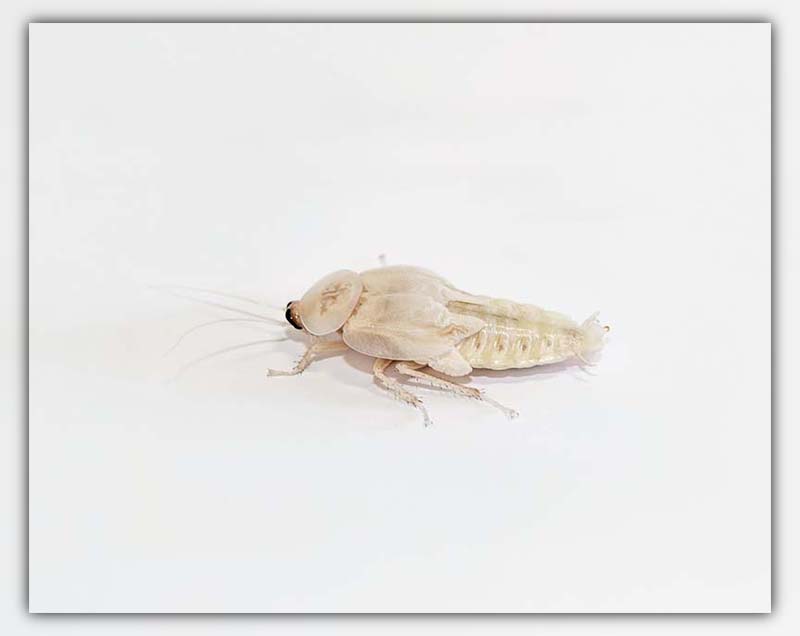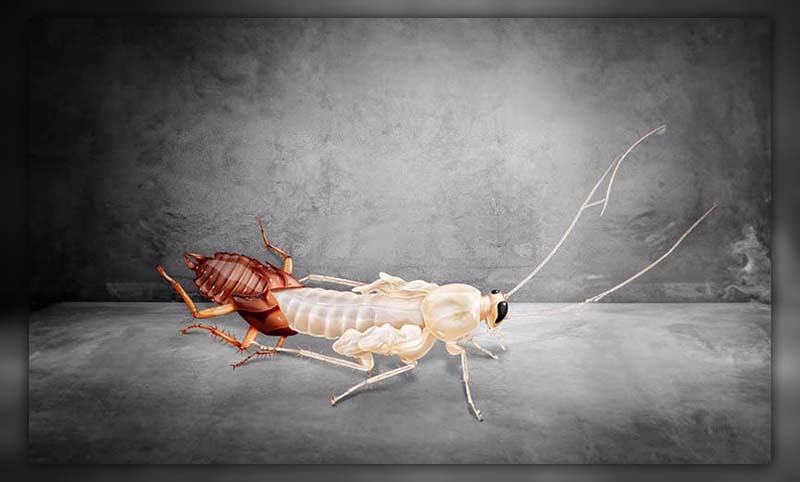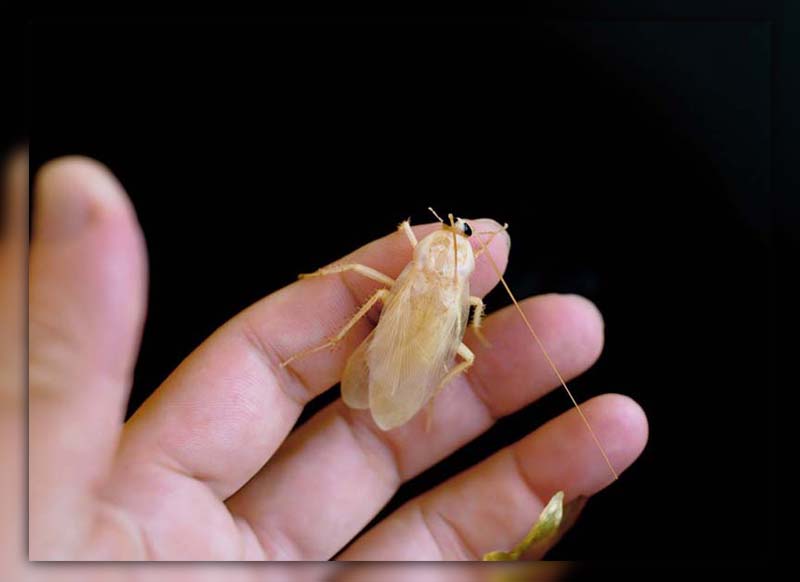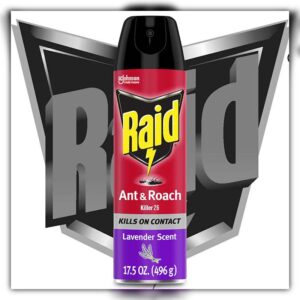“What is a white roach?” Encountering a light-colored cockroach can be both surprising and perplexing.
Explore our exploration on the white roach, as we uncover the secrets of these unique insects and the significance of their presence in our homes.
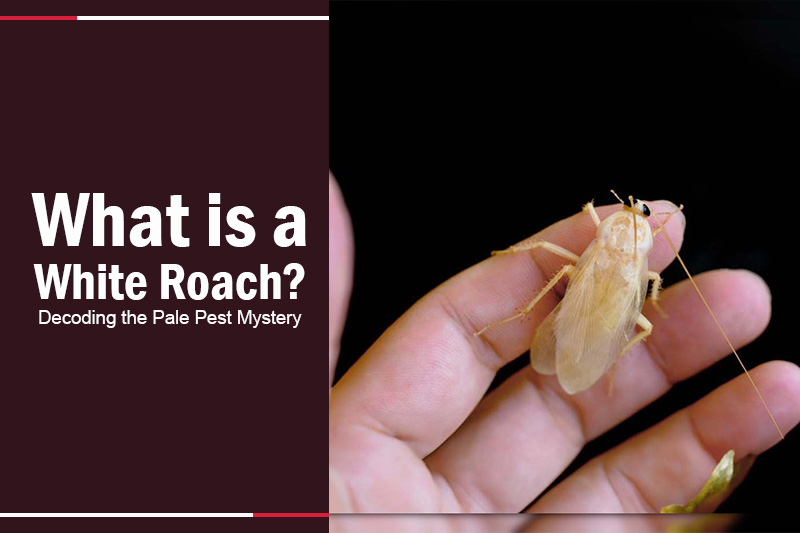
What Is A White Roach?
When you spot a white cockroach, you’re actually seeing a cockroach that has just molted, shedding its old exoskeleton. Beneath, the new exoskeleton is initially soft and pale, almost ghostly in appearance.
During this stage, they lose much of their body’s pigmentation, which will eventually be restored. While they might look like a rare or different species, they’re not. This pale state lasts only for a brief period, ranging from mere minutes to a few hours.
All cockroaches experience this transition phase known as an “instar.” By the time a cockroach reaches adulthood, it has undergone several molting cycles. As a result, these white roaches are more common than one might expect.
Their natural instinct to hide is heightened during this vulnerable period, making them even more elusive.
Read more Can cockroaches live in Penis? Truth and Myths!
What is albino cockroach?
The word ‘albino’ is used to describe animals with a genetic variation that limits their ability to produce pigment in their skin or exoskeleton.
However, white cockroaches aren’t lacking pigment because of a genetic anomaly, so they’re not albinos.
While there isn’t a specific scientific term for a white cockroach, they’re often called “molting cockroaches.” Before shedding their old exoskeleton, they need to develop a new one beneath it to hold their body structures intact.
This emerging skin is initially soft and lacks coloration. When it’s time for the roach to molt, they break free from their old layer. This fresh skin remains tender and pale for a short while.
And a fun tidbit: the discarded old exoskeleton? It’s known as an ‘exuviae’!
Are White Roaches Dangerous?
Though white cockroaches might appear unusual or even alarming, they don’t bite or possess stingers.
However, spotting one in your home should raise some flags. Just like any other cockroach, the appearance of a white roach points to underlying issues. Roaches, no matter their hue, are infamous for being carriers of diseases.
The remnants they leave behind, such as shed exoskeletons, feces, and egg cases, can trigger or exacerbate asthma and allergic reactions.
In more extreme scenarios, cockroach presence has been linked to cases of food contamination and subsequent poisoning.
Read more Cockroach Bite Marks: Are You a Victim?
How to Get Rid of White Roaches
Addressing the challenge posed by white cockroaches requires specialized strategies. Here’s a comprehensive guide on effectively tackling this issue:
Use insecticides
Insecticides are pivotal in combating roach invasions. Keep in mind that a white cockroach rarely stays out in the open for long, as it prefers to hide. Thus, prioritize locating their hideouts for treatment rather than spraying randomly.
Insecticides come in various forms: aerosols, liquids, edible dust, or bait.
Always follow the manufacturer’s guidelines for safe application and ensure you clear out kitchen utensils before starting to prevent contamination.
Spray them
When spraying, focus on the hideouts of white roaches, particularly areas with evident fecal markings.
It’s best to avoid general areas like countertops, floors, or walls, as this tends to be ineffective.
Get rid of white roaches with dust
Utilize substances like diatomaceous earth or boric acid. Sprinkle these on surfaces frequented by roaches. Once a white roach traverses an area coated with these substances, it’s doomed.
Use baits
Baiting stands out as a swift and efficient method to eradicate white roaches. Baits typically contain food elements that attract roaches.
After consumption, the roach dies shortly after. Even those that don’t eat the bait directly can succumb after consuming toxic residues found in the feces and saliva of the ones that did.
Ready-made baits are available for purchase, or you can craft your own by sprinkling insecticide on food remnants and placing them in roach-prone areas.
Keep away white German cockroaches with citrus
Citrus works wonders in deterring roaches. Its distinct aroma keeps these pests at bay. Incorporate a few drops of lemon oil into your mop water, ensuring a roach-free ambiance. This method is cost-effective and highly efficient.
Use Essential Oils
Essential oils present a non-toxic and highly effective solution. For targeting white cockroaches, opt for lemongrass or peppermint oil. Blend the chosen oil with water and mist over potential roach areas for a natural countermeasure.
Use baking soda
Baking soda provides a simple yet potent solution. Combine it with onions, place the mixture in areas previously infested, and await results. Attracted by the onions, roaches will inadvertently consume the baking soda, causing fatal bloating.
How to Prevent White Roaches
To minimize the unsettling sight of a cockroach darting across your kitchen, maintaining a clean environment is paramount.
Prioritize keeping your kitchen and bathrooms spick and span. Cockroaches flourish in unsanitary conditions.
Store food in sealed bags or containers, put away pet food overnight, and ensure trash bins have snug-fitting lids.
Also, always aim to keep these spaces dry. For an added line of defense, it’s wise to seal any cracks, sink drains, and electrical outlets.
Remember, roaches are persistent – they’ll go to great lengths to find a way into your home!
Read more Cockroaches carry disease: Home Hazards Unveiled.
Conclusion
In our exploration of “what is a white roach” we’ve ventured deep into the intriguing world of these unique pests, revealing their behaviors, habitats, and debunking the myths surrounding them.
As we conclude, we’d love to hear your personal encounters or curious questions about white roaches.
Don’t forget to check out more enlightening blogs from Pestweek. Your journey into the world of pests doesn’t have to end here—let’s continue exploring together!

Calina Mabel has over 15 years of experience in the field of journalism and communications. Currently, Calina Mabel is the Content Writer for categories such as Cockroach, Ants, Bed Bugs, Mosquito, Rodent, Termite, and Flies on Pestweek.com. She aims to build content for these categories with a focus on providing valuable and accessible information to readers, in order to create the world’s largest knowledge community about Pests.
All content written by Calina Mabel has been reviewed by Emily Carter.


